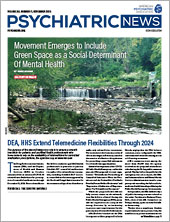Nonpharmacologic therapies such as motivational interviewing and cognitive-behavioral therapy (CBT) are essential to treatment for substance use disorder (SUD) because they equip patients with the skills they need to manage the thoughts and feelings that promote substance use. That was the message Carla Marienfeld, M.D., had for attendees of APA’s first meeting of @theAPA Educational Series, “Addictions Update,” in July.
“Many interventions for treating substance use disorder are focused on medication, yet most addiction treatment uses evidence-based nonpharmacologic modalities,” said Marienfeld, a health sciences clinical professor of psychiatry at the University of California, San Diego.
Marienfeld began her presentation with a description of motivational interviewing.
“Motivational interviewing is about arranging conversations so that people talk themselves into change based on their values and interests,” Marienfeld said. She explained that motivational interviewing is built on an understanding of two fundamental ideas.
First, “if there are two sides to an issue, and you take up one, you are inviting the other person to take up the other,” she said. Second, “in any conversation about something where there are two sides, we tend to remember and act on the things we hear ourselves say.”
To that end, motivational interviewing leverages patients’ own words to help them solidify their goals and prompt them to take action in treatment.
“It is a guiding style to draw out, encourage, and motivate patients to help them figure out how they can be successful,” Marienfeld said.
She also discussed systems therapy, which focuses not only on the patient, but the environment in which the patient operates, such as within a family, social circles, and the community.
“The idea of this type of therapy is that it focuses on the interaction patterns between the patient and those in the relationships with the patient, and when one part of the system changes, like the patient, the whole system has to change as well,” Marienfeld explained.
She added that system therapy often takes the form of family therapy, in which the impact of the patient’s substance use on others in the family is considered. These impacts may include impaired attachment, economic hardship, legal problems, emotional distress, and violence.
Marienfeld also discussed behavioral couples therapy for alcohol use disorder (AUD).
“Typically, this is a 12-session annualized support program that supports the relationship continuing throughout recovery,” Marienfeld explained. “When couples increase their support for recovery, they can help reinforce abstinence, build trust, and minimize negative interactions in the relationship. This support can help to enhance communication and relationship satisfaction.”
She added that behavioral couples therapy focuses on establishing shared goals, maximizing the rewards of not drinking, stopping behaviors that enable, and focusing on problem-solving.
Then there is the community reinforcement approach and family training intervention, which Marienfeld said shares several strategies with behavioral couples therapy for AUD, except that the others involved are not romantic partners of the person with SUD and are instead “concerned significant others.” This approach teaches the concerned significant others to modify their usual behaviors toward, reactions to, and expectations of the person who has SUD. Marienfeld explained that the concerned significant others learn how to use positive reinforcement but also to allow the person with SUD to suffer the natural consequences of substance use.
Marienfeld also described acceptance and commitment therapy, which highlights the context in which behavior or distress occurs as opposed to the form it takes. Acceptance and commitment therapy focuses on mindfulness practices, such as embracing thoughts and feelings without attempting to change them and creating space between experiencing a thought or feeling and the thought or feeling itself (for example, “I am having a thought that I am no good” instead of “I am no good”).
“Once we recognize negative thoughts, we can work on challenging them, which then impacts how we feel,” Marienfeld said. The focus of this approach is to develop “psychological flexibility” so that patients may process their thoughts and feelings and meet the challenges of life in an empowered way, she said.
Marienfeld rounded out her presentation with a discussion of CBT.
“Substance use is reinforcing,” she said. “It interacts with psychological or behavioral coping deficits to increase substance use.” For example, the patient may think “I can’t cope with anxiety without [the substance]” so the patient uses the substance. “Substance use disorder develops when this pattern is repeated over and over,” Marienfeld said.
CBT helps patients recognize critical or exaggerated thoughts or assumptions about themselves, the world, and others, so they can more effectively work on coping with the thoughts that lead them to substance use, Marienfeld said. ■

